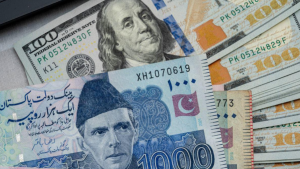
[ad_1]
The International Monetary Fund has demanded Pakistan cut down expenses as the two sides hold talks for a new bailout package to have economic stability in the country, sources said.
The demand came as Pakistan’s mounting debt burden and high-interest payments have put a significant strain on the country’s economy.
Data reveals that interest payments on public debt have surpassed the federal government’s net revenues, putting the sustainability of Pakistan’s economy in jeopardy.
In the first nine months of the current fiscal year, the country paid a staggering Rs5,518 billion in interest payments while the net revenues during the July-March period amounted to Rs5,313 billion.
Sources suggested that interest payments on debt are projected to reach Rs 9,787 billion in the next fiscal year, further exacerbating the government’s fiscal woes.
The current fiscal year’s target for interest payments was set at Rs7,303 billion, but the actual figure is expected to climb to Rs8,371 billion, a Rs1,068 billion overshoot.
Read More: IMF asks Pakistan to tax pensioners as mission lands in Islamabad for monetary talks
Pakistan’s high external funding needs and reliance on high-interest loans have been declared “dangerously unsustainable” by the IMF, which is pleading with the government to enact measures to lessen the debt load.
The lender has emphasized that maintaining Pakistan’s debt levels, which are expected to drop from 72.1% to 70% of GDP in the upcoming fiscal year, depends on the successful implementation of ongoing policy changes.
Although the South Asian nation has not disclosed the amount of the loan it is requesting from the Fund, Bloomberg News stated in February that it was at least $6 billion.
The report also stated that the nation would attempt to negotiate an Extended Fund Facility with the IMF.
Pakistan finished a $3 billion short-term program last month, which prevented a sovereign default; nevertheless, Prime Minister Shehbaz Sharif’s administration has emphasized the necessity of a new, longer-term program.
In its staff report earlier this week, the IMF acknowledged Pakistan’s economic improvement, however, it warned that the outlook remains challenging, with downside risks remaining exceptionally high.
The country narrowly averted default last summer, and its $350 billion economy has stabilized after the completion of the last IMF program, with inflation coming down to around 17% in April from a record high of 38% last May.
[ad_2]
Source link





